
Jon Garcia loves love.
The soft-spoken, thoughtful director had his breakout with the romance The Falls, a film about two Mormon missionaries in love, which he wrote and directed. He also scribed and helmed two sequels, The Falls: Testament of Love, and The Falls: Covenant of Grace. He also explored queer issues in the digital series Room to Grow, a documentary following LGBTQ children. The rest of his filmography also revisits themes of romance, including Tandem Hearts about young musicians in love, Sex Weather about interracial romance, and Love in Dangerous Times, about love during the COVID-19 pandemic.
Now Garcia ventures into prison–and back into gay territory–for his drama Luz, arriving on March 19 and on VOD April 9. The film follows Reuben (Ernesto Reyes), a young father sent to prison after a drunk driving accident. There his cellmate Carlos (Jesse Tayeh) gives him advice on how to navigate the ultra-macho atmosphere around the prisoners: never associate with homosexuals. How strange, then, that one late night-confession leads to a night of passionate lovemaking between the two. With Carlos leaving prison the next morning, Reuben vows to find him again, and build a new life for his young daughter away from their criminal family.
We sat down with Garcia just ahead of the release of Luz to discuss the film, his fascination with sexual fluidity, and how ultra-masculinity often conceals same-sex affection. Luz lands in theatres on March 19 and on VOD April 9.
How about we take this to the next level?
Our newsletter is like a refreshing cocktail (or mocktail) of LGBTQ+ entertainment and pop culture, served up with a side of eye-candy.
So how did you conceive of Ruben and Carlos?
I saw the movie Moonlight, and I just couldn’t stop thinking about it. I saw it a couple times in the theatre, and I really loved what it was saying about masculinity within black culture. I hadn’t seen something like that within Latino culture, not in a while. So I started creating the story shortly after that. I thought that prison would be a good place to tell the story. Sometimes, you know you want to say something, but you don’t know how to say it, so you start piecing it together little by little. Moonlight said some things I was trying to formulate a language for in prior movies I’d made. It was really inspiring for me.

Sure.
When I first started talking about Luz, I didn’t want to mention Moonlight. I didn’t want to be derivative. But now I think it’s ok: I love what Barry Jenkins did. It’s so beautiful. And a lot of inspiration came from people I knew growing up in South Texas, and seeing people living off the grid, off the freeway. Seeing the circumstances of how they lived that forced them into questionable activities.
Gotcha.
So I based it on that, and I formulated a story based on all these nuances that were inspiring me over a period of a couple years.
It’s interesting the emphasis you put on Moonlight. I love that film but didn’t make the connection between it and Luz. I totally see it now.
Your use of the color white was very interesting to me. You film the scenes in prison with almost a Kubrikean sterility; I kept thinking about 2001 or THX 1138. Was that a conscious choice?
I wish I could say it was by design…
[Laughter]
You put it so eloquently. It was, first, coming up with the garments they wear. We didn’t want typical orange jumpsuits. So [all white] was a low-cost option. I’m one of those people that when I see “it,” it makes sense. And we only had a little time in the prison yard. So we wanted to keep everything flowing, so we did one long take…because we were running out of time. I recognize what you’re talking about, but in the moment, doing it, it was nothing more [than circumstance].
Whatever the reason, it’s effective. One of the other films I kept thinking about was Fight Club, David Fincher’s film. The joke of that movie is that these guys beat each other up because they’re too scared to be gay. They’d be happier living as gay men. That’s obviously an issue here. What kind of statement do you feel like you’re making about masculinity in that context?
There are all different shades of it. These two men, they’re not struggling with internalized homophobia. They’re still very raw and tough and beautiful and relentless. There’s something really masculine about how affirmed they are. Throughout the film, they continue to affirm themselves as masculine men who happen to fall in love with men. But masculinity is fluid—that’s what I’m trying to say.

Do you see Carlos & Ruben as closeted bisexual men? Or their relationship more about desperation? What’s the statement about human sexuality you’re making?
It’s a soul-to-soul connection. It’s a theme I’ve been obsessed with in my last several stories where race, gender—these things don’t matter. There’s something higher. For me personally, the relationships I’ve had with men are transcendentally different than those I’ve had with women. They’re different, but they same. I don’t know—I have more of a spiritual connection with men in my life. There’s an honesty there. But I’ll leave it there for now.
You mention that this is a result of your experience and pondering as a Latino man. For our readers who are maybe not Latino, or don’t have much exposure to the community, what is the role and character of masculinity in the community?
Growing up in a Latino, Spanish-speaking household, I definitely felt don’t hold your books that way. Don’t wear your backpack that way. Don’t drink out of a bottle that way. I remember I was drinking from a Coke bottle, fishing on the border with my uncles in Mexico. And I drank out of the bottle and covered the top with my mouth. And my uncle said “Don’t drink like that.” And my dad, a quiet man of integrity, was like “Men don’t drink like that.”
[Laughter]
So things like that. I got really emotional after basketball games. I was the best player on the team in 8th grade, and my mom would come to me and say “Don’t let men see you cry, Jon.” These are all examples of—I can’t say they were toxic experiences. At the time it just felt there was a way I needed to act as a Latino man, a Catholic man. It’s hard to say what comes from where. My parents grew up very Catholic in South Texas, so I think those two influences, and being in the south—you feel pressure from these different places.
Sure.
I remember I was going to stay at a friend’s house, and my mother knew he was gay. She begged me to come home.
Wow.
And she’s a sweet lady. I remember watching The Falls, a movie I made about Mormons. Mom was sitting next to me, and it was the point where these two missionaries are in bed talking about Christ. And she leaned over to me and says “So they’re gay and they love Christ?” I’m like, yes. And that’s not just Latino culture.
Oh no.
But in Latino culture, there’s the machismo element. Growing up, all the men are outside having Budwiser and the women are inside cooking. That’s just how it was. And like I said, I didn’t see that as toxic. I’m still trying to discover the effects that’s had on myself, on men, and how we evolve from that.

All those elements you mention, to varying degrees—male identity, Latino culture, Catholicism—all make an appearance in the movie. Do you think doing the film offered you a certain catharsis on some of that strict, gender role upbringing?
These are great questions. You know, I wonder sometimes. I identify as a straight man, and I wonder if I’ve limited myself because I’m scared of what may happen if I venture further into this realm.
So much of your career involves queer stories though…
I have a fascination with telling love stories in general but LGBTQ+ narratives are often stories about love through adversity or love in opposition of the masses and I think that’s a very powerful thing. There are also many cisgender caucasian love stories that have been told and not as many LGBTQ+ stories.
True.
So, I’ve wondered. I had a friend tell me that if I have those feelings, I should give in and experience that. So I guess I ask those questions to myself in relationships to other men. The whole film allowed me to explore those places. I guess I’ve always viewed myself as tough, but I found moments while making the film, witnessing Ernesto and Jessie bring the story to life… We had moments like this, where they were processing it too. Jessie had never done a role like this before. Ernesto told me he could identify with some aspects of what Reuben was going through. So that helped me throughout the process. I need to think about it more to know what effect it had on me. But I know it’s a positive one.
Both Ernesto Reyes and Jessie Tayeh are very good here. They both go full-frontal here in some very frank scenes—scenes more graphic, incidentally, than some gay directors would do. How did you direct them in the sex scenes?
This was the most physical and explicit sex scene I’ve ever created on screen. We talked about it before, because in the script, it just said “And then they make love.” So we talked about it in person. I think we shot the sex scene on day two, day three. It’s interesting: we found out later that the fight scene and the sex scene have the same choreography.
Interesting.
And we shot them in reverse order. I asked them how far they were willing to go. We had the feeling they never had the freedom to experience one another. I thought it would be full of desire. So we had a closed set. It was myself and Sarah [Wheldon, the cinematographer]. Everything was very calm and to the point. If we wanted something, we didn’t hold back. And I always get nervous.
Related: WATCH: Hardened convicts find love in prison drama ‘Luz’
Really?
I always get nervous. I looked over at Sarah, and she was nervous. The boys were not nervous. After they were through the scene, we’d give them a robe and go to the next room for a break. We ran the scene three times, and I got more relaxed each time. We’d always communicate after. And Ernesto is hilarious. The scene we did before [the sex scene] was with my mother. And Ernesto went to my mother [Gloria Garcia, who plays Carlos’ mother in the film] and said “Gloria, the next time you see me, I won’t be a virgin anymore.” And she started laughing. Which is all to say there was also a little bit of humor.

That’s great.
The next time I do any scenes like this, I will have an intimacy coordinator on set. I realize how much more that can help me relax. I remember doing the fight scenes, one of the actors told me the next day that somebody was being more aggressive than the other. I realized that I should have had a conversation with the guys and checked in on them with the fight scene to see how they were feeling. I learned a lot as a director doing this. It was interesting.
I was looking at your body of work in preparation for this interview, and one element that stood out to me is this fascination you have with taboo love. In The Falls trilogy, that’s Mormon men in love. In Sex Weather, that’s interracial love. In Love in Dangerous times, its romance during a pandemic. What is that about for you? What intrigues you about the subject?
It’s funny you ask, because I’ve been wondering that. I’ve made 10 features now, and I wonder if I’m telling the same story over and over. They’re different, but in some ways it is this taboo love—that’s a good way to describe it. I’m just realizing that, so I’m wondering what I’m trying to say. I’ve pretty much been single throughout my film career, and I’ve noticed that the times I am involved in a relationship the void I need to create this kind of work is gone. I’m trying to process that, so I don’t have a clear answer for you. I’m trying to figure it out.
So you’ve done three films in the past year, which is outrageous. Where do you go next?
Yeah, I have Strictly for the Birds coming out, which is about two women who fall in love in a retirement community. And the actors play themselves in the movie.
Oh, interesting.
So that was pretty cool, seeing that come to life. There are a few I’m working on. I’m in Houston right now, but I’m thinking about making an Austin-based TV series. I love the town and have a lot of heart in that town. And I’ve been thinking about making The Falls 4, though I don’t know if anyone is asking for it. And I’m a big UFC fan. I love boxing and MMA. So I have two MMA films that are in development, one of which as an LGBTQ element. And UFC fighter Lauren Murphy—I’ve been talking to her about her life story. So I’m dabbling into different places.

Awesome. And if you want to do The Falls 4, you don’t need to do it for anybody but yourself. It’s a mistake to think otherwise. I know people will watch.
So last question: in many ways, this is a film about becoming a man, an adult. Moonlight works the same way. Having made a movie like this, do you feel like an adult at this point in your life? Or are you still working on that?
Oh wow. Interesting. I don’t feel like an adult. But I’m getting better all the time. The pandemic made me realize how unstable I am—financially, emotionally. And I’m also pretty strong. It let me know a lot about myself. So for me, I’m getting there. I think it’s a life-long journey.
Luz lands in theatres on March 19 and on VOD April 9.







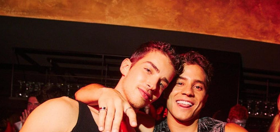
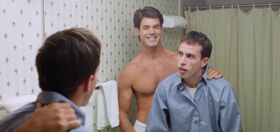


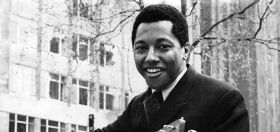
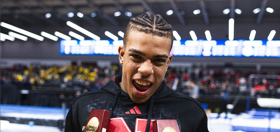


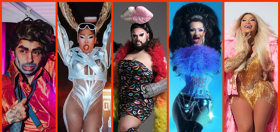

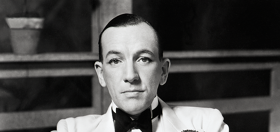
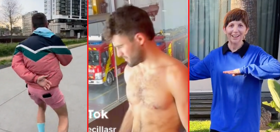


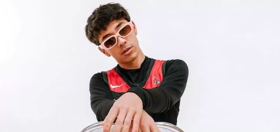
Manrico Jimenez
Gay Latinos REPRESENT!